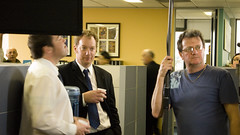Previous versions of the world’s most popular set of applications – which include Word, Outlook, Excel and PowerPoint – have allowed users to connect to LinkedIn using a plug-in called MS-Outlook Social Connector. The latest version of MS-Office not only has this plug-in built directly into the interface, it pulls far more information from Facebook than it did from LinkedIn.
From pulling Facebook photos into MS-Outlook, so now you’ll know what the other person you are emailing looks like, to revealing all their status updates, news feeds, even their wall posts – so you not only know what they like and are up too, but who their friends are, and what their friends like and are up too – all of this – and more is now publicly available to anyone you email using MS-Outlook, or any of the other MS-Office applications.
Cool sounding at first, but then think about all the personal information being shared. Do you really want your boss to see the drunken photos of you that you posted after celebrating your last birthday?
What if you are looking for work – do you want potential employers to see you vent off your frustrations about your current or past employer thanks to having access to your newsfeed and status updates?
Think you are very social network savvy, and you are extremely cautious about what you post on Facebook?
Doesn’t matter – if a friend posts something which you just might not want the whole world to know, too damn bad – because wall posts and news feeds are now shown directly in MS-Outlook.
So that video of you doing an air guitar rendition of Stairway to Heaven in your underwear that your girlfriend posted on her Facebook, could now be playing on a colleagues computer. Worse – that colleague can simply forward the email to everyone in your office so even your coworkers without Facebook accounts will see you dancing in your undies.
Social networking has come a long way in a very short time. It wasn’t all that long ago that unless you actually knew someone personally, you’d never know that person at all.
But thanks to the information powerhouse of the Internet, just type a name into a search engine, and you can see what they look like, who they work for, their kids names, the kind of car they drive, and even some of their silly photos from real-world social activities.
And thanks to Microsoft’s new and more direct integration of Facebook – the most popular social networking site – you don’t even have to search for the information. It’ll just appear right in your MS-Outlook inbox.
Not that social networking is all bad. Knowing more about a client may earn you brownie points and make your job easier.
If you discover that a hard to read client has just come back from a business trip in San Francisco, for example, you could use that as an opening to try and break the ice. Seeing photos of that client, with a beautiful woman wrapped around him while on that trip may prompt you to ask about his wife and their shared experiences on that trip, only to find out, that he didn’t take his wife on that “business” trip.
Uh-oh.
Awkward.
Thanks social networking!

![Reblog this post [with Zemanta]](http://img.zemanta.com/reblog_e.png?x-id=988d57c7-31c8-4c39-b123-e17080356d2f)
![Reblog this post [with Zemanta]](http://img.zemanta.com/reblog_e.png?x-id=8f67d5b3-7c91-4ecc-96ac-0aca53de9144)
![Reblog this post [with Zemanta]](http://img.zemanta.com/reblog_e.png?x-id=80723273-a13a-4402-a31b-5a151e56ca77)

![Reblog this post [with Zemanta]](http://img.zemanta.com/reblog_b.png?x-id=de821e11-551b-4251-a2da-46682df3c269)




![Reblog this post [with Zemanta]](http://img.zemanta.com/reblog_b.png?x-id=1140cecf-12a7-4a5d-a0d0-b427a52513a1)



![Reblog this post [with Zemanta]](http://img.zemanta.com/reblog_b.png?x-id=7320214a-0998-4546-92b6-a83c0a5fd4cf)

![Reblog this post [with Zemanta]](http://img.zemanta.com/reblog_b.png?x-id=8354aa16-97a8-4686-989d-c4a944ad3e1c)



![Reblog this post [with Zemanta]](http://img.zemanta.com/reblog_b.png?x-id=efb818ad-6a87-4cde-8048-dd5c0d64e30c)


![Reblog this post [with Zemanta]](http://img.zemanta.com/reblog_b.png?x-id=e9584032-388e-43c9-8f30-d1fa00f3342d)







